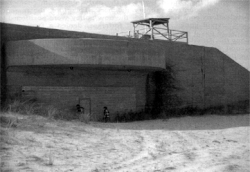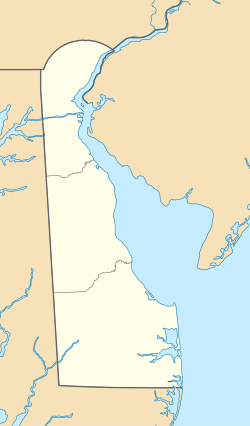Fort Miles
|
Fort Miles Historic District
|
|

Battery 519 at Fort Miles, Circa 1973
|
|
| Location | Cape Henlopen State Park, Sussex County, Delaware, USA |
|---|---|
| Nearest city | Lewes, Delaware |
| Coordinates | 38°46′50″N 75°05′30″W / 38.78056°N 75.09167°WCoordinates: 38°46′50″N 75°05′30″W / 38.78056°N 75.09167°W |
| Built | 1940 |
| Architectural style | Other |
| NRHP Reference # | |
| Added to NRHP | September 30, 2004 |
Fort Miles was an American military installation located on Cape Henlopen near Lewes, Delaware. Although funds to build the fort were approved in 1934, it was 1941 before the fort was constructed. It was built to defend Delaware Bay and the Delaware River and to protect domestic shipping from enemy fire within the capes, particularly from the German surface fleet. The fort also operated a controlled naval minefield to prevent ships entering the Delaware River estuary.
The fort was completed days before the attack on Pearl Harbor, Battery 118 (Battery Smith) being declared operational on December 4, 1941. The United States declaration of war on Japan compelled the U.S. Army to man the fort with the 261st Coast Artillery Battalion, who days before were slated to leave. Fourteen vessels, including the USS Jacob Jones, a naval destroyer, were sunk off the coast of New Jersey during the first six months of 1942. Numerous batteries (ranging from 90mm guns up to 16 inch) were installed at the fort and a large mine field was laid in the waters off Lewes, Delaware in the following years, but the fort was to see no action during the conflict. In May 1945, the soldiers would receive the surrender of U-858, a German U-boat that was part of Wolfpack Seewolf at the time of the German surrender to Allied forces in Europe.
At its peak, Fort Miles was home to over 2,200 soldiers, men and women, including the 261st Coast Artillery, the 21st Coast Artillery, the 52nd Coast Artillery (Railway), the 198th Coast Artillery (AA) and the 113th Infantry Detachment. Most of Fort Miles was declared surplus in 1948 and 1949, but the Army continued to use portions of it through the early 1990s as a morale, welfare and recreation (MWR) area for active and retired military personnel and their families, with the facility coming under the management of Fort Meade.
...
Wikipedia


